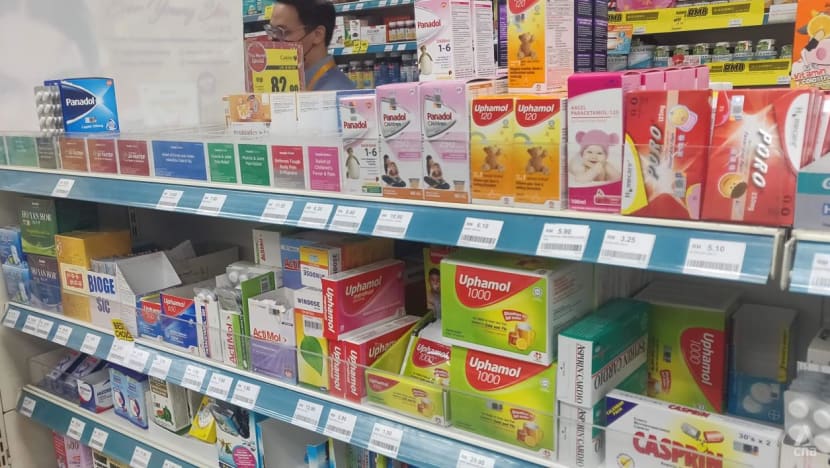No shortage of medicine supplies in Malaysia, says health ministry

Painkillers on display at a pharmacy in the Klang Valley. (Photo: CNA/Vincent Tan)
KUALA LUMPUR: While demand for certain products has increased, there is no overall supply shortage of medicines in Malaysia, the Health Ministry said.
Its pharmacy services senior director Norhaliza A Halim said in a statement on Friday (Jun 3) that there are alternatives with the same effect and manufacturers have increased their production capacities to meet the high demand.
“The responses received from the industrial parties showed there was a sudden surge in demand for a number of medicines such as products with paracetamol as the active ingredient (for treating fever and minor pain), Vitamin C, and cough and cold medicines for child use.
“However, at this point, no products have experienced total supply disruption as many products have alternatives from other brands with the same indications,” she said.
The ministry, through its pharmacy services programme, met representatives from the pharmaceutical industry on Thursday, including the Malaysian Organisation of Pharmaceutical Industries (MOPI), the Pharmaceutical Association of Malaysia (PhAMA) and the Malaysia Association of Pharmaceutical Suppliers (MAPS).
The statement was issued in response to reports on the shortage of medicines used to treat common ailments like fever, flu, cough and sorethroat, as well as those used to relieve the symptoms of hand, foot and mouth disease.
The ministry, Mdm Norhaliza added, would obtain further feedback from industry players regarding the actual status of medical supplies that are either produced in Malaysia or imported, as well as other related issues.
“Close monitoring and solutions for each issue experienced will be examined through continued communications between the Health Ministry and the pharmaceutical industry to ensure continued supply of good quality, safe and effective medicines for Malaysians,” she said.
DO NOT PANIC BUY: MEDICAL ASSOCIATION
On Thursday, Malaysian Medical Association president Koh Kar Chai advised the public not to panic buy and unnecessarily hoard medications which are not immediately needed.
He noted that there has been a shortage of certain medicines on the market, but this is not a new phenomenon and has been seen ever since countries began emerging from their lockdowns and resuming economic activities.
“Coupled with an unprecedented amount of demand for common medications brought on by the high incidence rate of the Omicron COVID-19 variant, many pharmaceuticals, both manufacturers and distributors alike, were caught off guard,” he said in a statement.
Dr Koh added that the industry has responded by placing larger orders from manufacturers overseas, while local manufacturers are scrambling to increase their capabilities, which are also dependent on raw materials sourced overseas.
“As this is a worldwide problem, imports of both the finished products as well as raw materials are affected,” he said.
“If uncorrected, even supply of other previously unaffected medications will be disrupted,” Dr Koh noted.

















